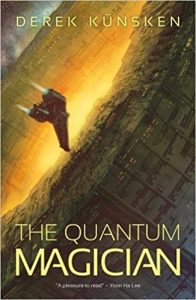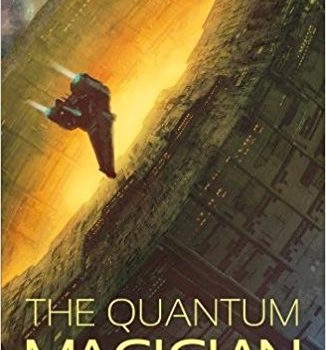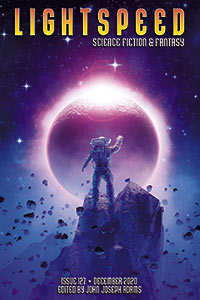Adam Roberts reviews The Quantum Magician by Derek Künsken
 The Quantum Magician, Derek Künsken (Solaris 978-1781085707, $11.99, 480pp, tp) October 2018.
The Quantum Magician, Derek Künsken (Solaris 978-1781085707, $11.99, 480pp, tp) October 2018.
This debut novel will do well. It is a fat, fun SF heist-thriller, a sort of Ocean’s 2487. Or The Superstring Sting. Or The It’s-alien Job. Or anything, really, rather than the oddly sword-and-sorcery-ish title Künsken has gone with. Get past the title, though, and the reader settles into a readable, eventful adventure narrative in which the jinks are hi- and the pretentions are low. It’s not Proust, but it certainly passes the time.
We’re in a 25th century in which humanity has spread to the stars, enabled by wormhole gates left over from a long vanished interstellar civilization. Access to these gates is, as you’d expect, tightly controlled, and when a group wants to smuggle a fleet of advanced spaceships across the galaxy without paying the requisite fee, they approach the galaxy’s finest con-man, Belisarius Arjona, for help. Belisarius gets the gang back together one last time to pull off the most audacious heist of his career: the old flame with whom he’s still secretly in love, the explosives expert, the inside-guy, the computing guy, the sweary macho guy, and so on. The novel spends 150 pages on Belisarius assembling this crew, a hundred or so getting everything ready for the plan, and then another 150 putting it into practice. It’s no spoiler to say that things don’t go smoothly. Things-not-going-smoothly is very much de rigueur for this sort of story.
Belisarius is a homo quantus, which means that his mind and body have been engineered to be able to see directly into the quantum realm (homo quantitans would be better Latin – the sapiens in homo sapiens i s a p articiple, n ot an adjective. Or maybe Künsken is happy for his readers to assume he’s making a reference to the Australian airline). The sensoriums of we ordinary humans are too crude to perceive quantum entanglement, of course: we collapse the waveform and only see the cat as alive or dead. Tweaked as he is, Belisarius can truly see the cat as both at once, which is what makes him such a talented con-artist.
This is, I think, a very cool idea and it’s one of a great many cool ideas in this novel. I particularly liked the idea of harnessing the whatever-it-was that caused such rapid expansion in the first seconds after the Big Bang in order to power spaceships and spaceweapons, and there’s some thought-provoking and well-handled material on a reviled human species, the Numen, who have genetically engineered a race of miniature humans literally to worship them.
There are problems, though. The whole book is written in the grey utility prose that too often characterizes this sort of novel: plain, rather dull and unafraid of cliché (characters ‘‘shoot’’ glances, nerves ‘‘explode’’ in pain, and so on). This would matter less if the quips were sharper, or the repartee funnier: Künsken tries for both things but lacks the astringency of wit to pull either off (‘‘You’re making explosives in prison?’’ Belisarius demanded. ‘‘Do you know how boring it is in here?’’ Marie yelled at him over the alarms. ‘‘I had to find a hobby!’’).
Künsken’s moments of ingenious originality only throw into sharper contrast those portions of his worldbuilding that fall back on present-day chestnuts. In this far-future interstellar society prisoners still wear orange jumpsuits, people still roll dice in casinos and luxury is still connoted by French cuisine and a glass of Pinot Noir. But the biggest missed opportunity here is Belisarius himself. His genetic modifications and his ability to see past Newtonian physics into the quantum substrate go no further than a kind of windowdressing to an otherwise bogstandard ordinary human subjectivity. A sensitivity to over-stimulation aside, his characterization conveys nothing more radically estranging or disconcerting. He’s a little diffident and fairly likeable and comes across very like a blandly 2018 sort-of guy.
Künsken has a wonderfully ingenious imagination, but I wonder if there’s a structural problem with the way he deploys it here. A conventional heist movie depends upon us already knowing how a bank, or a casino, works; the ingenuity of the con takes its force from that knowledge. In a far-future imagined world, though, the obstacles that our hero has to overcome have been arbitrarily installed via the author’s worldbuilding. You can tell the reader that this prison is unbreakable, and then tell that same reader your hero happens to have just the AI virus and the ability to mimic a guard’s ID signal to sneak him in and out, but you run the risk of him/her shrugging an if you say so, mate. I’m not suggesting that the heist in Quantum Magician is a cheat, exactly. I read the novel rapidly and with pleasure. I’m just wondering how effectively the heist-thriller sub-genre could ever be melded with SF.
This review and more like it in the June 2018 issue of Locus.
 While you are here, please take a moment to support Locus with a one-time or recurring donation. We rely on reader donations to keep the magazine and site going, and would like to keep the site paywall free, but WE NEED YOUR FINANCIAL SUPPORT to continue quality coverage of the science fiction and fantasy field.
While you are here, please take a moment to support Locus with a one-time or recurring donation. We rely on reader donations to keep the magazine and site going, and would like to keep the site paywall free, but WE NEED YOUR FINANCIAL SUPPORT to continue quality coverage of the science fiction and fantasy field.







